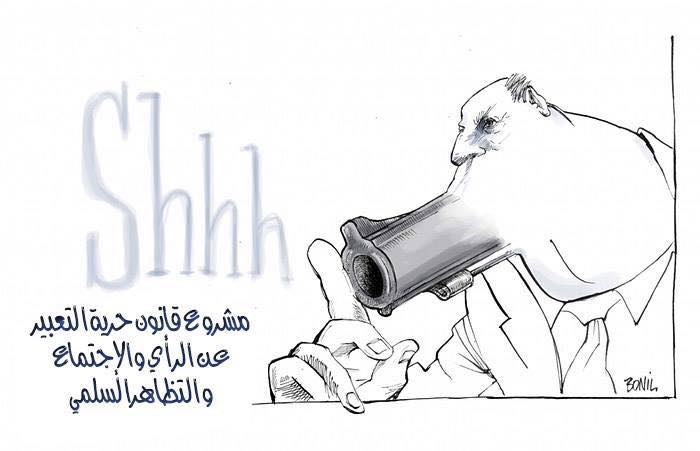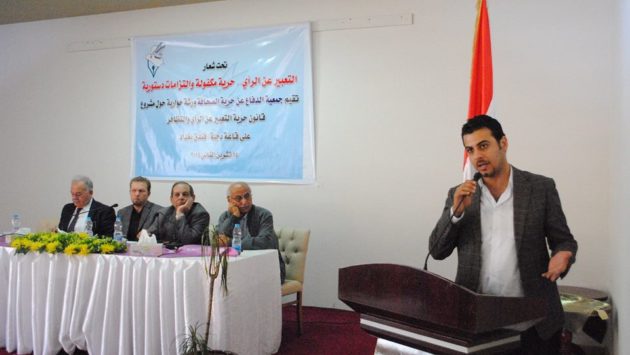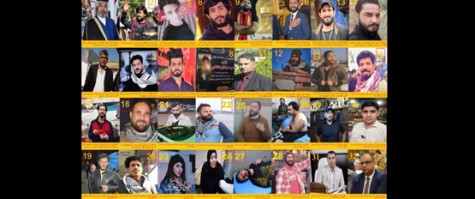Activists Convince Parliament to Withdraw a Law on Freedom of Expression, But Iraqis’ Rights are Still Threatened!

Iraqi Civil Society Solidarity Initiative, 23 May 2017
Iraqi civil society activists successfully pressured the Iraqi parliament to withdraw its draft law on freedom of expression that violated the principles of freedom of expression guaranteed by the Iraqi constitution and by international human rights conventions ratified by Iraq. In a hasty move at the beginning of May, parliamentarians submitted the draft law, which included clauses restricting freedoms and proposing punishment of imprisonment for those who demonstrate or participate in public gatherings. In response, a number of Iraqi civil society activists organized a demonstration in Tahrir Square in Baghdad, with solidarity protests in many other Iraqi governorates. The “Article 38 Coalition” organized a press conference at which it expressed its rejection of the current version of the law and called for specific amendments. Activists in the Coalition also organized meetings in the Iraqi parliament, after which the draft law was withdrawn from parliament’s agenda and a vote on the law was postponed to a later date. But this victory does not signal the end of all danger, as parliamentarians can reintroduce the draft law and threats to the freedom of expression and peaceful demonstration can reemerge at any moment!
Ignoring activists’ demands for amendments, the Iraqi parliament put forward an old version of the law and could have been voted on!
The draft law on freedom of expression and peaceful demonstration was introduced for the first time in the Iraqi parliament in 2011. At that time it faced strong opposition from activists, stakeholders and civil society organizations that viewed it as a blatant violation of the principles of the Iraqi constitution and international human rights law. The Iraqi Parliament delayed a vote on the law in order to include the recommendations of civil society representatives. There followed years of debate and negotiation between activists and the relevant parliamentary committees. Civil society activist and member of the Article 38 Coalition, Yasser Al-Salem said: “We were shocked that the Parliament ignored the amendments we proposed. The draft that was submitted is a bad draft that goes back to the time of the dictatorial regime, where some of its articles refer to laws that were passed during the time of Al-Ba’ath regime and are still in effect”.
The legal activist Mohammed al-Salami, also a member of the Article 38 Coalition, said: “In the draft law we see an incomprehensible overlap of three different issues: the right of access to information, the right to freedom of opinion and expression, and the right to peaceful demonstration. According to Article 38 of the Iraqi constitution, only the last issue (the right to peaceful demonstration) is subject to regulation, while freedom of expression is absolute and guaranteed by the same article. The right to access information must be regulated by a different law. This is why civil society demands that the name of the law be changed to the ‘Freedom of Peaceful Demonstration Law’”.
Government uses the current political and security crisis as a pretext to limit peaceful protest. How will activists respond?
Iraqi civil society activists want a law that will contribute to the stability of the country while guaranteeing the public’s constitutional rights for the long-term. The current unstable security situation should not be used to justify a bad law, that Iraqis would have to live under for many years. “The government should not ignore that activists are those most affected by the deterioration of the security situation and the most threatened with blackmail and abuse; so they are keen to move forward towards stable security. But, security precautions are not a reason to undermine the values of democracy”, Yasser al-Salem said.
In turn, Al-Salami stressed that the government is seeking through this law to restrict the right to peaceful demonstration. It would limit groups that are allowed to demonstrate to those that share the views and goals of the government, by requiring any group wishing to organize a demonstration to request permission from the head of the administrative unit five days before the date of the demonstration. The administrative unit has the right to approve or reject the all requests according to Article 7-1 of the draft law.
The second paragraph of the same article specifies that those who wish to demonstrate or hold a general meeting of three or more persons would be legally accountable in the event of any disturbance or riots during the demonstration or public meeting.
In accordance with Article 10-2 of the same law, no one would be allowed to demonstrate before 7 am or after 10 pm, which is an effort to end citizens’ right to organize sit-ins. Article 13 includes loose phrases such as “who is desolate, disfigured, defiled,” and opens the door wide to accuse activists and protesters of “contempt of religion”, which would be punishable by up to three years’ imprisonment and a fine of ten million dinars.
“Even after delaying the vote on the draft law, our movement will not stop. We are planning to hold more meetings with the concerned parliamentary committees (the Committee on Relations and Information, the Human Rights Committee, the Civil Society Committee, and the Legal Committee). We will continue our negotiations with them to reach an equitable formula that guarantees the establishment of the values of democracy. We will also visit the religious leaders in Najaf to inform them about what is going on and hope to win support for our position on this issue and for our belief in its influential role in shaping the social and political scene in Iraq”, Al-Salami pledged.
The Iraqi Civil Society Solidarity Initiative [ICSSI] fully supports the right of Iraqi activists to express their opinions, to demonstrate, and to access information in accordance with the rights guaranteed by the Iraqi constitution and by the international human right conventions ratified by the Republic of Iraq. The ICSSI calls on the international community in general and the Human Rights Office of the United Nations Assistance Mission for Iraq [UNAMI] and the European Union office in Baghdad in particular to declare their solidarity with Iraqi civil society activists who defend these rights that are an essential and important part of building a democratic Iraq that respects its international human rights obligations. The ICSSI calls on these parties to include these issues in their discussions with the Iraqi government and parliament on all upcoming occasions.




